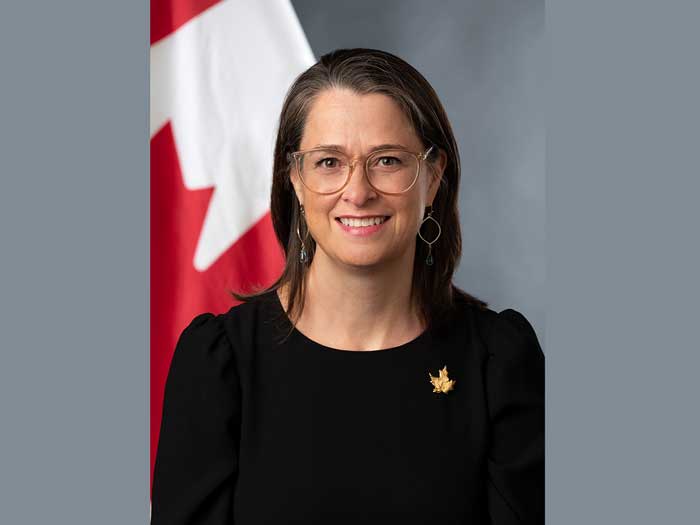
‘The need for urgent and ambitious action is now’
The 28th UN Climate Change Conference (COP 28) was held in the United Arab Emirates (UAE) from November 30 to December 12, 2023. In its aftermath, Canada’s Ambassador for Climate Change, Catherine Stewart, shares a snapshot of Canada’s key commitments and actions on climate change. From ambitious goals like tripling renewable energy to financial support for vulnerable nations to the role of alliances, Canada has an important role to play in combating climate change—as do CPAs.
CPA CANADA: Can you provide an overview of Canada’s key outcomes and commitments resulting from COP28?
Catherine Stewart (CS): At COP28, Canada and nearly 200 other countries reached a historic agreement on the Global Stocktake. It includes calls for groundbreaking collective efforts to accelerate the clean energy transition, such as tripling renewable energy, doubling energy efficiency and transitioning away from fossil fuels in energy systems towards net-zero by 2050.
In addition, Canada fought hard to ensure a continued commitment to the phasing out of inefficient fossil fuel subsidies and the acceleration of low-emissions technologies including carbon capture, utilization and storage. Although we would have liked to have seen a stronger commitment on coal power, we will continue to press on this issue. Coal is still the single largest source of CO2 emissions globally.
Canada also continued to champion the importance of delivering on broader climate finance commitments in support of global mitigation and adaptation efforts, including through Minister Steven Guilbeault’s role in co-facilitating the discussion on the means of implementation with Egypt at the ministerial level.
Additionally, Canada worked equally hard to ensure the importance of protecting nature to help fight the climate crisis. One year after Canada hosted COP15 [15th Conference of Parties to the UN Biodiversity Conference], Canada and partner countries secured recognition at COP28 that climate and biodiversity action are mutually reinforcing goals in the outcome text.
 Catherine Stewart is Canada’s Ambassador for Climate Change (Photo provided)
Catherine Stewart is Canada’s Ambassador for Climate Change (Photo provided)
CPA CANADA: What are the next steps required for implementing commitments made at COP28?
CS: COP28 and the UAE consensus marked a major step toward maintaining the Paris Agreement’s goal to limit warming to 1.5°C. It is now up to all countries, especially the major emitters of the world, to act. The next big step under the United Nations Framework Convention on Climate Change (UNFCCC) will be for Parties to update and submit new Nationally Determined Contributions (NDCs) in 2025 which will outline a 2035 emissions target and account for pledges made, including those made in Dubai.
Developing countries, especially the poorest and most vulnerable, will continue to require support in addressing climate change. Canada has shown leadership in international climate finance by providing funding to developing countries under its $5.3 billion commitment. Canada will also work hard to get an agreement this year to establish a new climate finance goal—the post-2025 New Collective Quantified Goal—that better meets their needs and priorities. This new goal should ensure that financial support is considered in the broadest sense.
For example, it needs to include but go beyond traditional contributors and identify ways to better leverage private capital for climate solutions. Canada will also want to ensure that we provide support to the most vulnerable countries in dealing with the adverse impacts of climate change through the global fund on loss and damage and we will continue to work with countries to deal with outstanding operational issues and encourage the broadest base of support for this fund.
CPA CANADA: How do we ensure that these promises are translated into tangible actions that contribute to global climate goals?
CS: Tangible action on adaptation will be crucial moving forward. In Dubai, we agreed to a framework for the Global Goal on Adaptation to strengthen adaptation efforts including by adopting comprehensive sectoral targets (e.g. resilience of water, food, health systems) by 2030 and progressively beyond. Countries will need to plan for how to work towards these targets and establish systems to monitor and measure progress towards them.
Domestically, Canada’s National Adaptation Strategy recognizes the differential vulnerabilities, needs and capacities of various groups. The Strategy is also underpinned by a set of guiding principles to direct and inform how to advance adaptation action in a fair, inclusive and equitable way. Internationally, Canada continues to support adaptation efforts through our climate finance of which at least 40 per cent will help developing countries adapt to and build more resilient societies.
Importantly, countries will need to remain engaged with one another, learn from each other and have frank conversations on the reality we find ourselves in. For Canada’s part, it will keep climate at the center of global conversations, including in the G20 and G7.
But Canada knows that’s not enough—the country faces the triple crisis of climate change, biodiversity loss and pollution, and the need for urgent and ambitious action is now. Integrated efforts to respond to this crisis will be vital, and the pace must be accelerated.
CPA CANADA: The controversy surrounding the wording of the agreement—specifically, the decision to “transition away” from fossil fuels rather than “phasing out”—has garnered significant attention. How do you envision this commitment being translated into practical and actional steps?
CS: In 2023, Canada joined G7 partners in a shared commitment to accelerate the phase out of unabated fossil fuels in line with net zero by 2050.
In a net-zero by 2050 world, both the Canada Energy Regulator and the International Energy Agency note that there will still be some oil and gas, but that it will need to be abated and its applications more limited to non-combustion. In addition, they note that the increase in alternative forms of clean and renewable energy will severely limit demand and therefore global production of oil and gas.
At home, Canada is putting in place a range of measures to help tackle emissions in the oil and gas sector, while creating good middle-class jobs. These measures include carbon pricing, the introduction of draft regulations to reduce methane emissions by at least 75 per cent in the oil and gas sector and the introduction of a framework to put a cap on oil and gas emissions. Canada is also the first G20 country to release a rigorous analytical guide that fulfills the commitment to phase out inefficient fossil fuel subsidies and we have ended public international support for unabated fossil fuels in 2022, and plan to phase out public financing for the sector this year.
CPA CANADA: How important are incentives to achieving Canada’s climate change goals?
CS: Canada experiences the direct impacts of climate change on a regular basis, whether it’s through extreme temperatures, more frequent violent storms or weather events causing flooding, droughts and wildfires. Our country is also warming at twice the rate of the rest of the world—three times faster in the North—which threatens livelihoods, cultures and traditions. Canada understands the importance of ambitious global climate action and collaboration.
To advance action on climate change, we need to use every tool in the toolbox. Canada’s 2030 Emissions Reduction Plan is our roadmap which outlines a sector-by-sector path to reach our emission target of 40 per cent below 2005 levels by 2030 and net-zero emissions by 2050. It highlights how Canada is taking bold and immediate action to reduce greenhouse gases (GHGs) to fight climate change, while strengthening our economy with sustainable jobs and clean industrial growth. And it includes more than 140 climate measures that we are working on with partners including provinces, territories and National Indigenous Organizations and $9.1 billion in new investments including incentive programs.
Canada recently released its first progress report on the implementation of the Emissions Reduction Plan which demonstrates how we are decoupling economic growth from emissions. In the transportation sector, for example, more and more Canadians and businesses are switching to zero-emission vehicles, taking advantage of incentive programs and lower operating and maintenance costs. The top five selling zero-emission vehicles all have a range of over 400 kilometres per charge, and prices are falling with more makes and models now available for sale.
CPA CANADA: In the context of global sustainability standards, how can CPAs play a role in addressing larger climate challenges? Specifically, how might these standards enhance climate reporting and mitigate the risk of greenwashing?
CS: Climate-related financial disclosure—a key element of sustainable finance—is essential to reflect the risk of climate change in financial markets. Increasing and improving climate-related financial disclosures provides a more robust view of climate resiliency and risks and opportunities, which promotes more informed investment, credit, and insurance underwriting decisions.
Markets, lenders, insurers, investors, policymakers and the public require standardized information about the climate-related risks and opportunities organizations face to ensure assets are correctly priced to reflect those risks. The prescription of standardized information also helps mitigate the risk of greenwashing.
In recent years, the importance of standardizing disclosure of climate-related financial risks has gained recognition. In 2017, the Task Force on Climate-related Financial Disclosures (TCFD) developed a framework to help companies more effectively disclose climate-related financial risks to investors, lenders, insurers, and other stakeholders.
The Government of Canada first announced its support for the TCFD’s voluntary framework in Budget 2019 and has since moved towards mandatory TCFD-aligned reporting of climate-related financial risks for federally regulated financial institutions and Crown Corporations.
In 2023, the International Sustainability Standards Board (ISSB) released its sustainability and climate disclosure standards. These standards build on the work of the TCFD and have been endorsed by the International Organization of Securities Commissions (IOSCO), representing regulators overseeing 95 per cent of the world’s capital markets.
As announced in the 2023 Fall Economic Statement, the Government is also undertaking next steps to develop a taxonomy that is aligned with reaching net zero by 2050. This work will help mitigate the risks of greenwashing by providing greater certainty on whether economic activities are aligned with credible, science-based transition pathways.
MORE ON ACCOUNTING AND CLIMATE CHANGE
CPA Canada has been a leader in championing sustainability as a good business practice. Discover these emissions management resources and learn more about the Sustainability and ESG certification program. Check out the 2024 ESG Symposium, which is coming up in June 2024 and counts towards CPD hours.
Plus, learn about Canada’s commitment to achieve net-zero emissions by 2050, and how CPAs can play a leading role in the transition.
Photo caption: Countries will need to plan for how to work towards climate targets and establish systems to monitor and measure progress towards them (Getty Images)